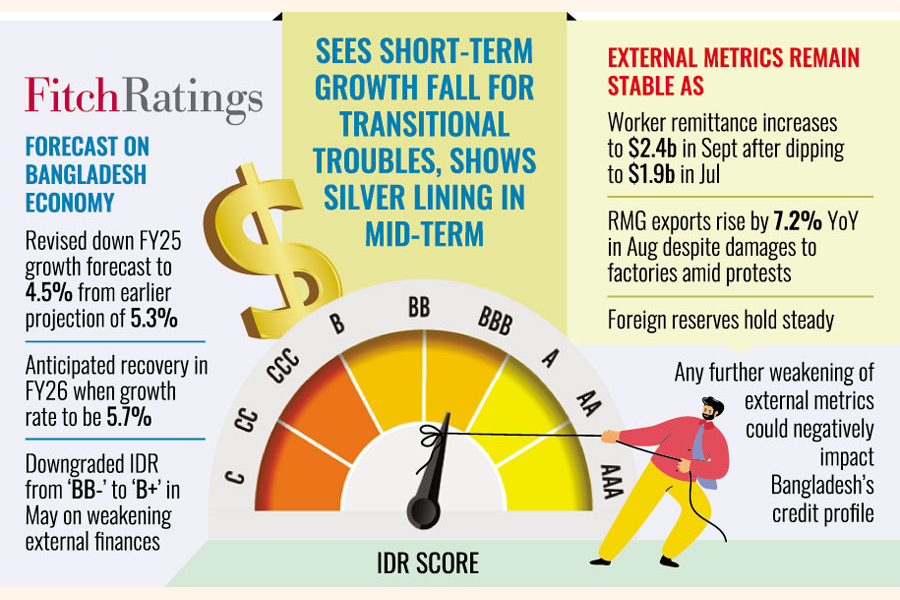Economic spinoffs of political changeover
Fitch forecasts macroeconomic pickup if reforms run

Published :
Updated :

Global credit-rating agency Fitch forecasts macroeconomic pickup in Bangladesh from the political transition-time setback, provided that the reforms spearheaded by the interim government sail through.
On the downside of the current situation, Fitch Ratings in its latest report notes that Bangladesh's political transition in August 2024 has heightened economic policy uncertainty in the short term.
However, the US-based agency expects the impact of the protests and leadership change on the country's economy to be transitory.
In its commentary received Monday, Fitch has emphasised that the political transition could potentially improve Bangladesh's credit metrics over the medium term, provided the government pursues reforms and enhances governance standards.
For the fiscal year 2025, ending June 30, 2025, Fitch has revised its growth forecast down to 4.5 per cent, from an earlier projection of 5.3 per cent.
However, it anticipates a recovery in fiscal year 2026, forecasting a growth rate of 5.7 per cent.
This past August, following weeks of student protests over a government jobs- quota programme, the Awami League government fell, and Prime Minister Sheikh Hasina fled to India.
On August 8, an interim government, led by Nobel Peace Prize laureate Mohammad Yunus, assumed office.
This also brought changes to the economic team, including the appointment of a new finance minister and central bank governor.
Prior to the protests, Bangladesh had been facing external financing challenges.
Fitch had downgraded Bangladesh's Long-Term Foreign-Currency Issuer Default Rating (IDR) from 'BB-' to 'B+' in May, citing a sustained weakening of its external finances.
The rating agency thinks that reversing these challenges will be difficult, despite some policy reforms.
It notes that since the leadership change, external metrics have remained stable with an upturn in macro-finance parameters.
Overseas worker remittances, for example, improved to US$2.4 billion in September after dipping to $1.9 billion in July.
Ready-made garment (RMG) exports, a key revenue source, rose by about 7.2 per cent year on year in August, despite some damage to factories during the protests.
Foreign-exchange reserves have also held steady during this period, totalling US$19.8 billion as of October 8, down slightly from $20.5 billion at the end of July.
In response to these developments, Bangladesh Bank raised its policy rate by 100 basis points after the new governor took office on the cusp of a unique changeover.
Additionally, the exchange rate depreciated following the shift to a crawling peg in May, which Fitch suggests could ease pressure on foreign reserves.
The interim government has also taken initial steps to stabilize the economy, including forming a taskforce to oversee banking-sector reforms.
However, significant risks to the baseline expectations remain in the agency's long view of exigencies that could surface. It notes that the timing of the upcoming general election is still uncertain, and political gridlock or renewed violence after the election cannot be ruled out, given the intense political polarization of the past decade. "Any further weakening of external metrics, particularly if it leads to a drop in foreign reserves, could negatively impact Bangladesh's credit profile."
Moreover, any substantial deviation from the targets of the 42-month IMF programme, which began in January 2023, could disrupt access to other multilateral funding.
Jasimharoon@yahoo.com


 For all latest news, follow The Financial Express Google News channel.
For all latest news, follow The Financial Express Google News channel.